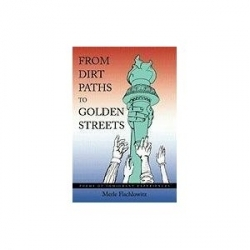From Dirt Paths to Golden Streets
Poems of Immigrant Experiences
The human transformation from immigrant to American is the focus of this lovely volume, which spans more than forty years of the poet’s profound, sensitive attention to people who arrived in the United States seeking refuge or pursuing “golden opportunities.”
The book begins with lyrical tellings of the experiences of European immigrants, stories that Fischlowitz heard from his Polish and Lithuanian grandparents and uncles, and others who adopted this country. The poem’s tone is gently gritty and deeply contemplative. “Soup,” which has been published in several other collections, describes how his wife’s cooking recalls the concentration camp that she escaped: she adds to the soup “a handful of pasta,/curved and stout as the women/whose pictures fill the photo albums/rescued from beneath the floor/of the bombed-out home.”
The piece called “Bagels” also uses food as an idiom for assimilation, depicting a family’s shift from Old World heavy dinners to a “modern, cholesterol-free/here-we-go-running-/into-the-21st-century/Southern California heat.//But we store bagels in our freezer/for a daily breakfast treat,/as one line of prayer/from a forgotten liturgy.” The sensations in this poem evoke the way immigrant families balance devotion to their heritage with adoption of new customs.
Later in this heartfelt collection, Fischlowitz turns his insightful attention to the struggles of immigrants from Latin America, Asia, and Africa. Here again he bases his impressions on personal contacts: He became friends with many immigrant families during his work as an educator and psychologist in Maryland, Hawaii, and his native Missouri.
These more hopeful poems are written in the voices of people who come to the United States seeking opportunities rather than asylum. Their tone is uplifting. For instance, in “Reach Tomorrow,” a girl arrives from Vietnam to join her husband. When the groom’s aunt apologizes for the traffic, the bride replies: “No!/In Saigon it’s worse than here […] In America you have big roads, much space/and room to reach tomorrow.”
Fischlowitz employs simple vocabulary and faint echoes of rhyme, and includes foreign-language terms with footnote explanations, embodying the way many immigrants retain their identity in a new world. His love for America shines through this exquisite book, with candle flames in darkness rather than spotlights on trumpets and flags. The poems build from specific representations of significant minutiae, like Sabbath candlesticks and baby clothes, to broad reflections like the importance of knowing one’s heritage in “Freed, Delivered, Redeemed,” and the transformative human magic to be found in “The Second Tongue”: “I reach to grasp the thought/cast in words I do not know or understand/and listen for the heartbeat,/the sigh, the gasp of breath,/that unexpressed ‘I’/which moved another’s pen to write/or mouth to speak.”
Especially now, when many Americans fear immigrants and laws begin to impose oppression rather than advance freedom, our nation can turn to these poems and be glad that Merle Fischlowitz’s heart and pen were moved to write.
Reviewed by
Karen McCarthy
Disclosure: This article is not an endorsement, but a review. The publisher of this book provided free copies of the book and paid a small fee to have their book reviewed by a professional reviewer. Foreword Reviews and Clarion Reviews make no guarantee that the publisher will receive a positive review. Foreword Magazine, Inc. is disclosing this in accordance with the Federal Trade Commission’s 16 CFR, Part 255.

